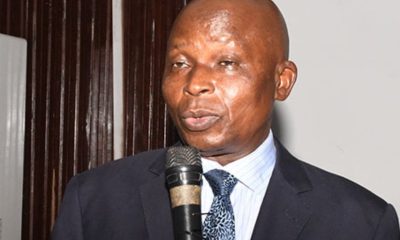Headline
Gunmen invade Maku’s residence, injure 4 security personnel

Yet-to-be-identified gunmen on Saturday night invaded the residence of Mr Labaran Maku, former Minister of Information, at Akpata community in Akun, Nassarawa-Eggon Local Government Area in Nasarawa State.
The News Agency of Nigeria (NAN) reports that the invaders injured four security personnel.
One of the injured security personnel told NAN on Sunday that the criminals invaded the residence about 7:50 p.m.
“The criminals forced their way into the residence and started shooting sporadically, injuring four of us in the process.
“They were many and kept communicating in Hausa language while banging the main gate to the house.
“When I refused to open the gate for them because I did not know who they were, they started shooting and jumped the fence into the compound,” he said.
Commenting on the incident, Maku decried the spate of kidnapping, banditry and other forms of insecurity in all parts of the state.
The former minister particularly said the state was under siege, adding that it was the third time his residence and relatives were attacked by criminals.
“You will remember that about a month ago, these criminal elements invaded my father’s compound at the village and kidnapped three of my family members.
“About two years ago, they killed two of my elder brother’s children at his residence in Gudi community of Akwanga Local Government Area.
“What happened today shows clearly that our state is under siege,” Maku said.
Meanwhile, Gov. Abdullahi Sule has condemned the attack and directed the security agencies to arrest the perpetrators.
The governor’s directive was contained in a statement by Mr. Peter Ahemba, his Senior Special Assistant (SSA) on Public Affairs.
The statement quoted the governor as saying that government had adopted modalities toward tackling all forms of insecurity in the state.
Headline
Fagbemi warns against obstructing EFCC from performing its lawful duty

The Minister of Justice, Lateef Fagbemi, SAN has warned against obstructing the Economic and Financial Crimes Commission (EFCC) from carrying out its lawful duty .
Fagbemi’s warning is contained in a statement in Abuja.
“This is a matter of very grave concern, it is now beyond doubt that the EFCC is given power by the law to invite any person of interest to interact with them in the course of their investigations into any matter, regardless of status.
“Therefore, the least that we can all do when invited, is not to put any obstruction in the way of EFCC, but to honourably answer their invitation.
“A situation where public officials who are themselves subject of protection by law enforcement agents will set up a stratagem of obstruction to the civil and commendable efforts of the EFCC to perform its duty is to say the least, insufferably disquieting’’.
He added that running away from the law will not resolve issues at stake but only exacerbate them.
“Nigeria has a vibrant judicial system that is capable of protecting everyone who follows the rule of law in seeking protection.
“I therefore encourage anyone who has been invited by the EFCC or any other agency to immediately toe the path of decency and civility by honouring such invitation instead of embarking on a temporising self-help and escapism.
“This can only put our country in bad light before the rest of the world’’.
He said institutions of state should be allowed to function effectively and efficiently.
“I stand for the rule of law and will promptly call EFCC, and indeed any other agency to order when there is an indication of any transgressions of the fundamental rights of any Nigerian by any of the agencies’’.
NAN reports that the EFCC had on Wednesday warned members of the public that it was a criminal offence to obstruct officers of the Commission from carrying out their lawful duties.
Section 38(2)(a(b) of the EFCC Establishment Act makes it an offence to prevent officers of the Commission from carrying out their lawful duties. Culprits risk a jail term of not less than five years.
The warning , the EFCC said, became necessary against the background of the increasing tendency by persons and groups under investigation by the Commission to take the laws into their hands by recruiting thugs to obstruct lawful operations of the EFCC.
On several occasions, the anti graft agency said, operatives of the Commission have had to exercise utmost restraint in the face of such provocation to avoid a breakdown of law and order.
Headline
Unknown Gunmen Abduct Channelstv Reporter In Port-harcourt

Some unknown gunmen have kidnapped Joshua Rogers, the ChannelsTV reporter in Port-Harcourt, the Rivers State capital.
Politics Nigeria learnt that Rogers was picked up close to his residence at Rumuosi in Port Harcourt and to an unknown destination by the gunmen around 9pm on Thursday, April 11.
The reporter was driving his official ChannelsTV branded car when the hoodlums accosted, pointed a gun at him and took him away in the same vehicle.
Rogers was said to be returning from his official assignment in Government House after a trip to Andoni for a government event when the incident happened.
Already, the gunmen were said to have contacted his wife and demanded a N30million ransom for bis release.
His cameraman confirmed the incident and appealed to his abductors to set him free unconditionally.
-

 Business5 days ago
Business5 days agoSeplat Energy celebrates a decade of Dual Listing with Bell Ringing Ceremony at Nigerian Stock Exchange
-

 News5 days ago
News5 days agoBDCs now buying dollar at ₦980 — ABCON President
-

 Metro5 days ago
Metro5 days agoOsun Poly Student, Olanrewaju Olatona killed by hit-and-run one-way driver
-

 Headline5 days ago
Headline5 days agoFagbemi warns against obstructing EFCC from performing its lawful duty
-

 News5 days ago
News5 days agoLASG’s maize palliative impactful, says poultry association chair
-

 News5 days ago
News5 days agoWoman killed while crossing road in Anambra








